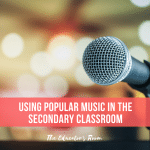I recently read an article on Politico where a group of “30 smart macro thinkers” recently contemplated how the Coronavirus will change the world. While many of their thoughts are far too Shangri-La and delusionally optimistic, it got me thinking about how this pandemic will change education – with 8 bold statements I’ll make, and, in a separate article, 8 big questions in that remain unanswered in our Post-COVID-19 educational world.
8 Bold Statements:
- This will be the 9/11 of our students’ lifetime.
I will forever remember Thursday, March 12th as a week’s worth of worry came to a head. As the virus crept more and more closely into our daily lives, by Tuesday, March 10th, our district asked us to have a plan in place to teach remotely. The night before Friday, March 13th, I was restless and cast aside my lesson on American imperialism to teach about how pandemics have impacted humankind. Later that day, schools were closed for a 2-week minimum in Pennsylvania. It’s now going on 3 weeks since I’ve seen them, and I won’t see them for another month. Students are going to have flashbulb memories of this event in ways others remember the JFK assassination or 9/11 terrorist attack if only because of how historic and tragic a moment it is and may become. - Every home needs to be provided Internet access.
As a member of our union’s political endorsement team, I interviewed a candidate running for state legislature in a rural community. He explained how this pandemic was exemplary about how much we rely upon the Internet, and that everyone should be granted access to high-speed Internet, especially in the rural and inner-city WiFi deserts. Now that many of the world’s students have moved online, even just temporarily, the lack of high-speed Internet is both a violation of Free and Appropriate Public Education (FAPE) and a travesty of learning. - Our students are part of the front line, and they have that to be proud of.
When I venture to the grocery store to shop for my family, friends, and neighbors, I run into current and former students who have been diligently stocking the shelves and patiently checking out customers. Some others are the truck drivers who have brought the freight to the stores. Others are young nurses and doctors whose faces have been worn raw by the wearing of masks and gloves. A common American aphorism is “a hero is an ordinary person who behaves extraordinarily.” We are watching heroes step up right before our eyes, often in the most unlikely of places. - We have individual and collective lack of foresight, and too much change, too soon, and too quickly can add to the problem.
I’m astounded by how many people have rushed to the store to load up on toilet paper and other paper products, practically decimating that shelf space now for weeks. How many beans, pasta, and sauce are now the possessions of those who have bunkered down. Stores were just as unprepared as their shoppers were. In a similar fashion, it’s unsurprising how unready schools, teachers, and parents have been for something of this nature. We’ve taken for granted what has been done, and now that it can’t be done that way, we’re scrambling. Our next moves, however, need to be thoughtful and practiced for success. - Schools are more than just a place to learn.
The big question members of the community of schools were not solely educational. How will we ensure our neediest students will have access to meals? How will they receive counseling and support? What about continuing occupational therapy? For better and for worse, schools have supported the whole child, and COVID-19 has shown just how vital they are to many children’s lives. - Basic hygiene needs to be part of the curriculum. So does time to implement it.
As we learned more about how the Coronavirus was transferred from person to person, it’s amazing how common hygiene tactics like washing hands and not touching one’s face could’ve thwarted the passing of this virus. Even as I reminded the 8th-grade students in my class about how to reduce the risk by – at the very least – washing up before eating lunch, still upwards of 90% of our 1,500 students rushed to lunch to get their coveted seat or to fill their empty bellies. What’s worse is our schedules – with 3-minute intervals between classes – don’t often permit the time to use the restroom, let alone to properly wash up afterward. No wonder we have a health crisis on our hands; we haven’t been coaching our kids to comply with basic hygiene. - So does basic technology etiquette.
Now that many of us across the world are performing our work online if it permits, there are specific unwritten rules that should be adhered to when it comes to using Zoom, working in a group, chatting one-on-one, or any other types of technology to ensure productivity is maximized. But as Ina Fred of Axios and Richie Crowley of PS I Love You note, this is not a time for judgment as we struggle to work in our new normal. This is a time for grace. - Education’s economic difficulty will not be felt not now, but in the next 2-4 years.
When the 2008 economic crisis hit, teachers watched as their friends and family lost their jobs while theirs remained comparatively stable. Similarly, while the economic pain will be a yoke carried by specific households of our students, teachers, and paraprofessionals, the bigger burden won’t come for a few more years. Come the 2010-11 school year, the chickens had come to roost as the crash impacted states’ and school districts’ bottom lines, making difficult decisions on programs, pensions, hiring, construction, and student support.
Where are the questions about teaching in a Post-COVID-19 World, you may ask? Click here to examine 8 head-scratchers I pose regarding the future of education.
Please also consider reading my colleague Adam Sutton’s article on “The Ideal School Amid the COVID-19 Pandemic” as a great guide for our current situation.






